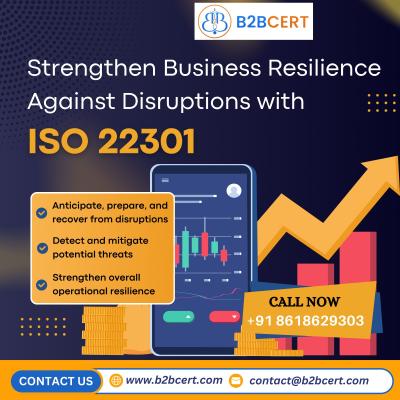What Process Do You Follow for Internal Audits and Management
-
In today’s volatile business environment, disruptions such as cyberattacks, natural disasters, or supply chain breakdowns can severely impact an organization’s operations. To ensure resilience and continuity, many businesses adopt a Business Continuity Management System (BCMS) aligned with ISO 22301, the international standard for business continuity. A crucial part of maintaining and improving a BCMS is conducting internal audits and management reviews. These processes ensure the system remains effective, compliant, and continuously improving.
For organizations in Bangalore looking to enhance their resilience, achieving ISO 22301 Certification in Bangalore not only builds trust but also demonstrates a proactive approach to managing business continuity risks. Let’s explore the detailed process followed for internal audits and management reviews under ISO 22301.
1. Understanding the Importance of Internal Audits in BCMS
An internal audit is a systematic, independent, and documented process used to evaluate whether a BCMS conforms to ISO 22301 requirements and organizational objectives. Internal audits help identify gaps, nonconformities, and opportunities for improvement before external certification audits occur.
The internal audit process ensures that:
-
Business continuity policies are effectively implemented.
-
Plans and recovery procedures are regularly tested and updated.
-
Employees are aware of their roles during disruptions.
-
Risks and vulnerabilities are assessed and managed proactively.
Organizations that engage experienced ISO 22301 Consultants in Bangalore can establish a strong internal audit framework, ensuring the BCMS remains compliant and efficient.
2. Steps Involved in the Internal Audit Process
A structured approach to internal auditing ensures that all aspects of the BCMS are thoroughly reviewed. The process generally includes the following steps:
a) Audit Planning
The process begins with developing an annual audit plan that defines the scope, frequency, and objectives of the internal audits. The plan should cover all BCMS elements, such as risk assessments, business impact analysis, incident response plans, and recovery strategies.
b) Preparation of the Audit Checklist
An audit checklist is created based on ISO 22301 clauses and organizational procedures. This ensures that the audit remains focused and comprehensive. The checklist may include questions like:
-
Are recovery time objectives (RTOs) regularly reviewed?
-
Are communication procedures tested and updated?
-
Are critical business functions identified and prioritized?
c) Conducting the Audit
During the audit, auditors collect evidence through interviews, document reviews, and observations. They verify that processes are implemented as documented and assess their effectiveness. The audit should be objective and conducted by trained personnel independent of the area being audited.
d) Reporting Findings
After completing the audit, the findings are compiled into a formal audit report. This report highlights:
-
Nonconformities
-
Observations
-
Areas of improvement
-
Positive practices
The report is shared with management for review and corrective action planning.
e) Corrective Actions
Nonconformities identified during the audit must be addressed through corrective actions. The organization must determine the root cause, implement solutions, and verify the effectiveness of these actions in subsequent audits.
By using ISO 22301 Services in Bangalore, organizations can ensure that their audit processes align with best practices and are guided by experts familiar with both ISO requirements and local business environments.
3. Conducting Management Reviews for BCMS
While internal audits evaluate the operational effectiveness of the BCMS, management reviews ensure strategic alignment with organizational goals. Top management plays a vital role in this process by reviewing performance data, assessing risks, and determining areas for improvement.
a) Frequency and Objectives
Management reviews are typically conducted at planned intervals (annually or semi-annually). The objective is to ensure the BCMS remains suitable, adequate, and effective in supporting business continuity goals.
b) Inputs to Management Review
Key inputs to management reviews include:
-
Results of internal and external audits
-
Progress on corrective and preventive actions
-
Performance metrics and test results from business continuity exercises
-
Feedback from interested parties (customers, suppliers, regulators)
-
Changes in legal, regulatory, or business environments
-
Resource needs and staff competency updates
c) Outputs of Management Review
After reviewing the above inputs, management decides on:
-
Opportunities for improvement
-
Changes to the BCMS scope or objectives
-
Allocation of resources
-
Recommendations for training or process enhancements
The outcomes are documented and communicated throughout the organization, ensuring accountability and continuous improvement.
4. Integration of Audits and Reviews for Continuous Improvement
Internal audits and management reviews work hand-in-hand. The audit provides factual data and insights, while management reviews translate those insights into strategic decisions. Together, they create a feedback loop that strengthens the BCMS over time.
A well-established BCMS supported by these processes helps organizations in Bangalore:
-
Respond effectively to disruptions
-
Maintain customer confidence
-
Protect brand reputation
-
Achieve and sustain ISO 22301 Certification in Bangalore
5. The Role of Professional ISO 22301 Consultants and Services
Implementing a robust BCMS and managing its audits and reviews can be complex. This is where ISO 22301 Consultants in Bangalore play an essential role. They provide expert guidance in:
-
Developing internal audit procedures
-
Conducting mock audits
-
Training internal auditors
-
Facilitating management review meetings
-
Preparing for certification audits
Partnering with professional ISO 22301 Services in Bangalore ensures that the BCMS not only meets ISO requirements but also aligns with organizational objectives and regulatory expectations.
Conclusion
Internal audits and management reviews form the backbone of an effective Business Continuity Management System. They ensure that the system remains compliant, effective, and continually improving. For organizations in Bangalore, engaging with trusted ISO 22301 Consultants in Bangalore and leveraging comprehensive ISO 22301 Services in Bangalore can simplify the certification journey and help maintain operational resilience.
By following a structured and disciplined process for audits and management reviews, your organization can confidently navigate disruptions, safeguard its operations, and demonstrate its commitment to business continuity excellence.
-
